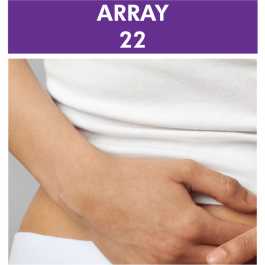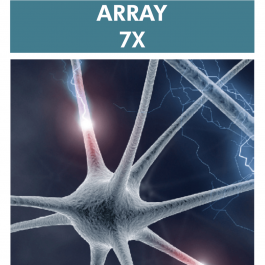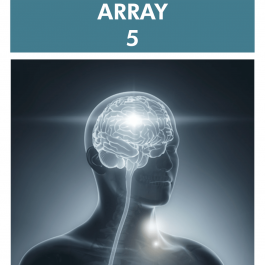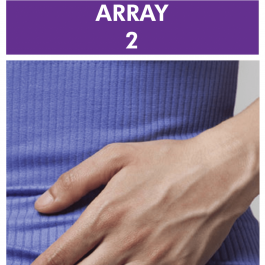
Array 11 Chemical Immune Reactivity Screen
Levels Indicate Exposure. Antibodies Indicate Body Burden.
Array 11 measures an expanded range of environmental chemical toxins that bind to human tissues versus other laboratory tests that only identify chemical exposure.
Clinical Use
- Identify the loss of immune tolerance associated with chemical exposure, which may lead to autoimmune reactivity
- Assist in setting guidelines for the avoidance of specific chemicals to reduce the risk of igniting the autoimmune process
- Monitor the effectiveness of the clinical protocols
Recommended For Anyone With:
- Increased chemical sensitivity/intolerance.
- Loss of immune tolerance and/or abnormal immune function
- Autoimmune disease and/or a family history of autoimmune disease
Antigens Tested (IgG + IgA Combined, IgM Tested Separately for Each Antigen)
- Aflatoxins
- Formaldehyde + Glutaraldehyde
- Isocyanate
- Trimellitic + Phthalic Anhydrides
- Benzene Ring Compounds
- BPA Binding Protein
- Bisphenol A
- Tetrabromobisphenol A
- Tetrachloroethylene
- Parabens
- Mercury Compounds
- Mixed Heavy Metals (Nickel, Cobalt, Cadmium, Lead, Arsenic)
Click Here to View Test Brochure
Frequently Asked Questions
Below are answers to some common questions about Array 11 – Chemical Immune Reactivity Screen from Cyrex Laboratories.
Q: What is the difference between measuring chemical levels and Array 11?
A: Tests that measure levels of chemicals in stool, urine or hair, while providing evidence of exposure, fail in determining a person’s health risk. Two people may have the same exposure to a particular chemical and one will not be affected while the other can have significant health consequences from it. Looking at the humoral immune response tells us more than just levels do, it tells us how the person is reacting to the given exposure. Humoral immunity, the system in which antibodies are produced to fight/recognize invading elements, is tested for a variety of clinical purposes from allergies to viral infections. This same trusted testing methodology can be used to detect antibodies to chemicals bound to human tissue.
Q: What are the possible immune responses to chemical exposures?
A: Depending on the person’s genetic ability to handle chemicals, amount and duration of exposure and body burden of accumulated insults, adverse effects on the immune system can result from exposure to chemicals (immunotoxicity) such as immune suppression or immune stimulation.
Immune suppression leaves the patient more susceptible to infections. Combinations of chemical and stealth organism exposures have been shown to contribute to illness.
Immune stimulation may result in allergic reactions or autoimmunity. Autoimmune responses can be induced by environmental chemicals through a variety of effects including cellular, biochemical and molecular.[1]
- Bigazzi PE. Autoimmunity caused by xenobiotics. Toxicology, 1997; 119:1-21.
Q: What do the results of Array 11 say about the duration of chemical exposure?
A: Any antibody production is an indication of exposure to the chemical and the binding of the chemical to human tissue, resulting in body burden to the chemical. According to Greim, IgM is produced as a primary response in the first days of defense. If previous exposures have occurred, a secondary immune response results in IgG production. High levels of these antibodies indicate an immune reaction to an antigen which threatens the homeostasis of the body and may result in autoimmune reactivity.
- [Greim P, Wulferink M, Sachs B, et al. Allergic and autoimmune reactions to xenobiotics: how do they arise? Immunol Today, 1998; 19(3):133-141.]
Q: Does the level of antibodies correlate with the quantity of exposure?
A: No. Each person has an individual response to chemicals. Some patients may have low-level exposure, but high body-burden (elevated antibodies), while others may have high or acute-level exposure, but no measurable body burden (normal antibody levels).
Q: How do chemicals enter the body?
A: Depending upon the chemical and its use, infiltration of the body can occur by contact (through the skin), inhalation (through the lungs), and ingestion (through the gastrointestinal tract).
Q: Are there any medications, foods, conditions, or other factors that could interfere with the results of Array 11?
A: While Cyrex is unable to provide an exhaustive answer to this question due to the interactive complexities and varieties of medications and patient circumstances, the following has been noted:
Array 11 assesses immune reactivity to chemicals bound to human tissue. Most medications, both over-the-counter and prescription, are chemicals which may also bind to human tissue and therefore may interfere with Array 11 results. Large molecular weight pharmaceuticals can elicit antibody production by themselves. Low molecular weight pharmaceuticals are haptens that may bind to human proteins and cause immune responses. Pharmaceuticals may also induce neo-antigen production with possible cross-reactivity. [1]
Pharmaceutical and OTC medications have been shown in in-vitro assessments to possibly interfere with Array 11 results. It may be helpful, if applicable under the guidance of a physician, that medications be cleared from the system prior to testing. Depending on individual immune response to medications, additional time for potential drug-induced neo-antigen antibody reduction may be helpful.
- [Vos JG, van der Laan JW, van Loveren H, et al. (2005) Immunotoxicology. In FP Nijkamp and MJ Parnham (Eds.), Principles of Immunopharmacology, 2nd edition (pp 559-589). Basal, Boston, Berlin: Birkhäuser Verlag.]
Q: Do chemicals play a role in the development of Alzheimer’s Disease
A: Toxic heavy metals and chemicals are all around us, in our environment and in our foods. When chemicals enter the body, they can bind to human tissue proteins. When this happens, it can misfold the protein into a structure that is similar to amyloid-beta. This creates antibodies against the chemicals bound to the human tissue and actually target the amyloid-beta peptide, potentially leading to amyloid plaque formation, a major contributor to the development of Alzheimer’s disease.
Please Note:
It is recommended that you are clear of immunosuppressants and corticosteroids for at least 60 days prior to taking the test. Please consult with your prescribing healthcare provider.
Not available in New York. Specimen draws can be completed in neighboring states.
*Please read the following prior to placing your lab test order*
- All sales are final and no refunds will be afforded and you waive any rights to charge-back your purchase with your credit card processor.
- theDr.com does not participate in, take assignment, or accept any private insurance. We do not provide super bills and cannot assist with claim resolution for laboratory tests or consultations.
- Orders for this test are accepted form the United States Only. International Orders are not accepted for this test.
- TheDr.com is unable to ship test kits to the state of New York as per state laws.
- TheDr.com is unable to ship lab kits to P.O. boxes. Please use a residential or business address.
- Some lab providers fill out requisition forms ahead of time with client information. To avoid confusion when processing orders, if you are ordering lab kits for multiple people, please place a separate order for each person.
- After you order a test kit, getting the lab draw and/or completing the test is your responsibility.
- Once thedr.com has received your test results, the results will be uploaded to your HIPAA compliant client portal and you will receive an email instructing you how to access them.
- Cyrex Labs covers a flat rate with contracted labs for the phlebotomy services associated with their test kits requiring a blood draw. Depending on the location and lab, additional draw fees may be required.
- Once you have purchased your test, your requisition will contain the necessary information to schedule a blood draw here: https://www.cyrexlabs.com/PayformyTest/tabid/126/Default.aspx
- If you live in a remote location, you may need to travel a distance or ask your local physician or hospital to assist with phlebotomy.
- We recommend contacting the draw center and scheduling an appointment for your blood draw in advance.
- Please contact testing@thedr.com with questions.
- This test does NOT include a test interpretation consultation. If you are interested in having your test results interpreted please contact our former director of Clinical services Michelle Ross, MS, MA, CNS, LDN, IFMCP at info@michelleross.com once you have received your test results.
- *Test interpretations must take place within 3 months of placing the test order.
- Michelle Ross is a Certified Nutrition Specialist, a Licensed Dietitian-Nutritionist and an Institute of Functional Medicine Certified Practitioner. Graduating Summa Cum Laude from the University of Bridgeport, Michelle holds a Master of Science in Human Nutrition and a master’s degree in Education from Pacific Union College. Michelle’s graduate school thesis focused on the complexity of gluten-related disorders and the potentially devastating effects of gluten on the body. She has been extensively trained in the advanced interpretation of functional testing, autoimmune diseases, gluten- and wheat- related disorders, and microbiome health.
Before Placing Your Order Please Read
The Complete Terms and Conditions for Cyrex Test Orders at theDr.com
Cyrex Laboratories is CLIA* certified and licensed in the state of Arizona. Cyrex participates in CAP (College of American Pathologists) surveys to assure quality procedures and regulatory compliance. Cyrex Laboratories follows the strictest federal guidelines for the development of its assays.
*Congress passed the Clinical Laboratory Improvement Amendments (CLIA) in 1988, establishing quality standards for all laboratory testing to ensure the accuracy, reliability, and timeliness of patient test results regardless of where the test is performed.





